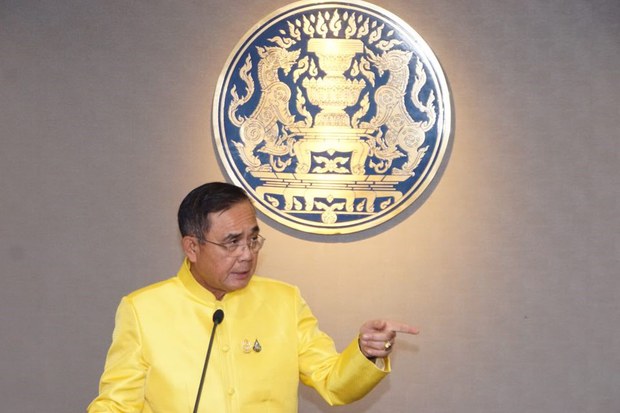Thai Junta Fills Senate with Military, Police Officers
2019.05.14
Bangkok
 Prime Minister Prayuth Chan-o-cha speaks to reporters about his choices for senatorial seats during a news briefing at the Government House, May 14, 2019.
Prime Minister Prayuth Chan-o-cha speaks to reporters about his choices for senatorial seats during a news briefing at the Government House, May 14, 2019.
The Thai government on Tuesday named 250 new senators, including many who served as military or police officers, forming a crucial voting bloc that could pave the way for incumbent leader Prayuth Chan-o-cha to remain prime minister.
The list of senators – handpicked by Prayuth's government and endorsed by the king – was published in the Royal Gazette on Tuesday. Because of their backgrounds, the new senators could help the military further entrench its influence in the government, an analyst said, noting that Prayuth became prime minister after leading a military coup in 2014.
“It reflects power retention of the junta after the election,” said Titipol Phakdeewanich, dean of political science at Ubon Ratchathani University. “It highlights the fact that the country hasn’t truly returned to democracy as the military continues entrench its power and its role in politics.”
The announcement came days after the Election Commission officially announced 498 members of the 500-member lower parliament – 349 of whom were elected and 149 party-list seats filled using a mathematical calculation based on the total vote.
The senate list includes more than 100 active and retired military and police officers, 15 former ministers in Prayuth’s cabinet, former legislative members and a handful of professionals. Prayuth’s brother and brothers of his deputies Prawit Wongsuwan and Wissanu Krea-ngam are on the list. Only 26 are women.
Under the military-drafted constitution, the two houses of parliament will vote for a new prime minister. To form a new government, a candidate must have 376 votes, one more than half of the 750 legislators.
Because he picked the senators, Prayuth expects they will vote for him, meaning he needs only 126 members of the lower house to support him. On Monday, the Palang Pracharat Party (PPP), the major party supporting Prayuth, announced it formed a coalition with smaller parties to reach that number. Published election results showed that PPP won 115 seats.
The parliament’s first session will take place on May 22 to select the speaker, who will initiate the process of voting for the new premier, the Royal Gazette also said on Tuesday.
Wissanu Krea-ngam, deputy prime minister of legal affairs, said the election of the chief executive should be finished by the end of the month.
An opposition party leader, meanwhile, questioned the legitimacy of the senate selection process.
“The senators were appointed by the NCPO ... if the 250 senators vote for Prayuth to be prime minister, will they perform their duty without conflict of interest?” asked Piyabutr Saengkanokkul, secretary-general of the anti-junta Future Forward Party, referring to the acronym for National Council for Peace and Order, the junta’s official name.
The Future Forward Party, which won 80 elected and party-list seats, formed an alliance with other parties, including the Pheu Thai Party, which won 136 seats in the election but picked up no party-list seats. The opposition coalition claimed 245 members – far short of the number needed to form a government.







